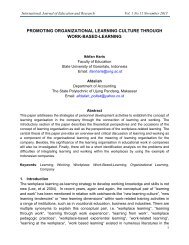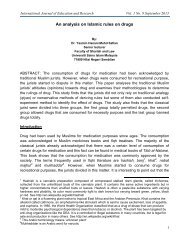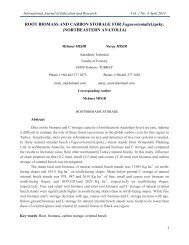A Special Case of Pathetic Fallacy: Papini's Picasso - International ...
A Special Case of Pathetic Fallacy: Papini's Picasso - International ...
A Special Case of Pathetic Fallacy: Papini's Picasso - International ...
Create successful ePaper yourself
Turn your PDF publications into a flip-book with our unique Google optimized e-Paper software.
ISSN: 2201-6333 (Print) ISSN: 2201-6740 (Online)<br />
www.ijern.com<br />
him paternity for other peoples ideas, but by permeating his definitional frame and establishing new<br />
relations with the outside, understood temporally and spatially, so that the value <strong>of</strong> his theory to be<br />
reenacted in the contemporary stage <strong>of</strong> art theory, at a level that himself was probably not conscious<br />
<strong>of</strong>.<br />
The anthropological theory provided by Gell (Gell, 1998) <strong>of</strong>fers us the important elements<br />
needed for enlarging the signification horizon adumbrated by the concept <strong>of</strong> pathetic fallacy, his<br />
descriptive account <strong>of</strong> the distributed person being to some extent revelatory to our concern, but<br />
these elements achieve their righteous value understood only in the post-structuralist thought<br />
environment where the concept <strong>of</strong> image as functional simulacrum was extensively theorized<br />
(Baudrillard, 1994).<br />
2. <strong>Pathetic</strong> <strong>Fallacy</strong>: Conceptual Framework<br />
The definition given by Ruskin for pathetic fallacy to which we refer is not textually<br />
circumscribed but it can be derived from a series <strong>of</strong> examples which he provides in order to qualify<br />
it first as an “error, that which the mind admits when affected strongly by emotion” (Ruskin, 1863,<br />
p. 159), second as “a falseness in all our impressions <strong>of</strong> external things” (Ruskin, 1863, p. 159),<br />
third as an thinking error occurring in those having “a mind and body in some sort too weak to deal<br />
fully with what is before them or upon them; borne away, or over-clouded, or over-dazzled by<br />
emotion” (Ruskin, 1863, p. 162) but all the above mentioned examples deal with cases in which<br />
some particular poet uses personification as a mean to describe some object's qualities, in other<br />
words ascribing human characteristics to things. The particular use Ruskin gives to pathetic fallacy<br />
is nonetheless different from the usual personification as he points out the importance <strong>of</strong> the<br />
“violent feelings” which have a strong effect on us.<br />
We have also to consider the fact that the pathos is not that <strong>of</strong> the inanimate things which<br />
have to deal with those human feelings being cast upon them, but <strong>of</strong> the human subject who has to<br />
deal with his own emotions in order not to be overwhelmed by them and to keep his balance<br />
between sensitivity and intellect when he chooses to report his perception <strong>of</strong> a phenomenon.<br />
For Ruskin, this ability <strong>of</strong> keeping oneself steady in front <strong>of</strong> any possible distortion <strong>of</strong> his<br />
perception is the criteria for valuating poets, but also ordinary people. He does admit that, in the<br />
end, “however great a man may be, there are always some subjects which ought to throw him <strong>of</strong>f<br />
his balance” (Ruskin, 1863, p. 163) but we must make the difference between the “weaker man,<br />
overborne by weaker things” (Ruskin, 1863, p. 163), and those men driven by “prophetic<br />
inspiration” defined by Ruskin as “the men who, strong as human creatures can be, are yet<br />
submitted to influences stronger than they, and see in a sort untruly, because what they see is<br />
inconceivably above them.” (Ruskin, 1863, p. 163) These are the two extremes <strong>of</strong> a scale which<br />
comprises also the first order <strong>of</strong> poets, those “who feel strongly, think strongly, and see truly”<br />
(Ruskin, 1863, p. 163) opposed to those <strong>of</strong> the second order, which we already mentioned when we<br />
referred to “weaker” men, their weakness being one <strong>of</strong> the intellect and also the reason for their<br />
falseness in seeing.<br />
He concludes this dissertation over the specified form <strong>of</strong> erroneous thinking reinforcing his<br />
opinion that “the pathetic fallacy, — that so far as it is a fallacy, it is always the sign <strong>of</strong> a morbid<br />
2





